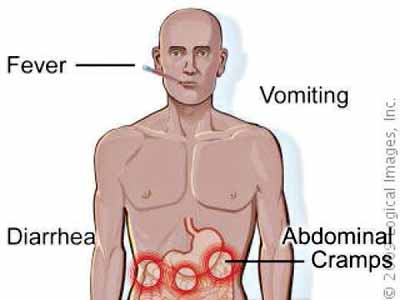 TYPHOID fever can be life-threatening if it is not detected and treated at the early stages. With an early treatment, typhoid fever usually resolves within two to four weeks without any form of complications. However, if wrong diagnosis is done or if the treatment is incomplete, the typhoid fever may relapse and may also lead to complications.
TYPHOID fever can be life-threatening if it is not detected and treated at the early stages. With an early treatment, typhoid fever usually resolves within two to four weeks without any form of complications. However, if wrong diagnosis is done or if the treatment is incomplete, the typhoid fever may relapse and may also lead to complications.
Studies have shown that in the third to the fourth week of untreated enteric fever, nearly one-third of the patients develop sever complications, such as intestinal bleeding, holes in the large and small intestines, which often results in a life-threatening medical emergency known as peritonitis, a condition where the content of the small and large intestines may leak into the abdominal cavity. It has been observed that 20 per cent cases of untreated typhoid fever patients die after about the third week of the salmonella typhi exposure, and in most cases, the death is usually due to gastrointestinal bleeding, bowel perforation and peritonitis.
Other complication that may result from an untreated or poorly treated typhoid fever include infections of the urinary tract, kidneys and kidney failure, gallbladder, bones (osteomyelitis), septic arthritis, infection and inflammation of the heart muscles (endocarditis), spinal cord and the brain (meningitis), pneumonia, splenic and hepatic abscesses, shock, psychotic behaviour, etc. Early diagnosis and appropriate treatment of typhoid fever reduces the risk of complications and fatality rate.
However, it is important to note that similar conditions that mimic enteric fever, such as malaria, hepatitis, amoebiasis, pneumonia, tuberculosis, etc must be ruled out or excluded first. Also, it should be known that relapse is very common with typhoid fever and children respond better to typhoid therapies than the elderly.
Natural And Home Treatments For Typhoid Fever In uncomplicated cases of typhoid fever (salmonella infections), the patient is usually given a sponge bath at room temperature using the infusion or the decoction of any of these fever-reducing herbs: Fever plant (Ocimum gratissimum); lemon grass (Cymbopogon citrates); Nigeria senna (Cassia occidentalis); neem (Azadirachta indica); local catnip (Solenostemun monostachyus); etc to help lower the high body temperature, especially in children.
At the same time, an infusion or the decoction of any of the herbs can be given as a retention enema to help cleanse the bowels and further lower the body temperature.
Alternatively, cold water compresses may be applied to the head or all over the body to help bring down the body temperature. If the typhoid gives rise to diarrhea, this may result in loss of body fluid, water-soluble vitamins and therefore, dehydration. This loss is usually compensated by giving the patient copious amounts of fluids in the form of tender coconut water as an oral rehydration therapy (ORT), plenty of orange juice, fresh apple juice and fresh paw-paw peels soaked in clean water, banana and milk shake.
A vegetable broth made from vegetables, such as carrot, celery, onion, ginger, fever plant, spinach, etc are equally beneficial to the patients with salmonella infection. In addition to the above prescriptions, the patient is also given herbal teas (infusions) or the decoction of herbs that have antimicrobial activities, such as: A mixture of stone breaker (Phyllanthus nuriri) and Balsam pear (Momordica charantia).
A mixture of Eucalyptus (Eucalyptus globules), African Mistletoe (Loranthus falcatus) and Vervain (Stachytarpheta indica). A mixture of lemon grass (Cymbopogon citrates), bark of Alstonia boonei, whole limes fruit, grapefruits, unripe papaw and pineapples fruits and garlic cloves. A decoction of Neem leaves, bark or root. Other antimicrobial herbs that are also useful in the treatment of typhoid fever are Dandelion, Echinacea, Myrrh, Golden seal, Yarrow, Sage, Boneset and Chamomile.
A combination of goldenseal root, myrrh and cayenne is available in capsules and is sold as food supplement in most health stores for typhoid fever therapy. Depending on the severity of infection, most natural therapies may last for up to three weeks or more. During the therapy, the patients should avoid: Red meat.
Egg and other protein-rich food, except after recovery from the illness. This is because the digestive system of most typhoid fever patients is weak when the infection is active. Rather, the diet should consist mainly of: Fruit and vegetable juices. Wholesome and easily digestible carbohydrates. A complete bed rest during the treatment may be imperative and pure air and good ventilation is essential. Prevention Of Typhoid fever The first line of action in the effective prevention of typhoid fever is to avoid the lifestyle habits that weaken those innate protective mechanisms or immunity. Such lifestyle habits like: Excessive intake of “junk” foods.
Excessive consumption of alcoholic beverages. Cigarette smoking. Indiscriminate use of antibiotics and other drugs. The control and prevention of typhoid fever should also start with personal hygiene. Hands must be properly washed with clean water and soap immediately after using the toilet and before eating. Studies have shown that Salmonellae typhi can survival in water and multiply and grow in polluted water during hot weathers.
For these reasons, water drinking and water for domestic uses (such as for cooking foods, washing of cooking utensils, washing of vegetables, fruits, etc.) must be boiled and filtered properly before use. For those who can afford it, bottled water may be better. Drinking or eating (e.g. foods, salads, etc) in unreliable and unhygienic places should be avoided.
Fresh vegetables for preparing foods and salads should be sterilised before use, especially if they are from unknown sources. Fresh meat should be refrigerated and if frozen, it should be thawed and cooked as soon as possible. Sea foods, poultry and other foods rich in protein should not be prepared and left for hours at room temperature before eating, as this may provide fertile ground for the spread of salmonellae.
All food handlers should be screened regularly to isolate those who are carriers and those who are infected with Salmonellae typhi. Carriers should not be allowed to handle foods until they are properly treated. Human fecal waste matters should be disposed of properly and public water supplies must be protected from contamination and should be treated adequately.
Medically, anti-typhoid vaccines are available for immunisation against salmonella. In some chronic cases of typhoid fever, the removal of the gallbladder has proven to be necessary and effective in eliminating the bacteria.






